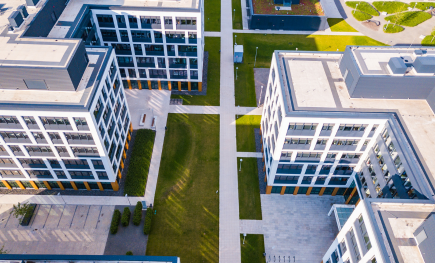Introduction
As Virginia continues to establish itself as a central hub in the digital economy, data centers have become critical to supporting our extensive digital needs. These facilities are essential for cloud computing, internet services, and managing the vast amounts of data generated by businesses and consumers. The advent of artificial intelligence (AI) further highlights the strategic importance of these data centers. Companies like NVIDIA are at the forefront of the AI revolution, developing chips that power AI applications. This technology surge is driving unprecedented demand for data center services as noted in a recent Wall Street Journal article, highlighting the massive investments in computational infrastructure to keep pace with AI advancements (read more).
Economic Impact of Data Centers
Data centers contribute significantly to Virginia’s economy, particularly in Northern Virginia, which hosts the largest concentration of data centers worldwide. These facilities not only invest in construction and operations but also support local businesses indirectly and provide substantial property tax revenue to localities. Their presence is a significant driver of economic growth. The Virginia Joint Legislative Audit and Review Commission (JLARC) has highlighted that data centers are a crucial sector, with substantial impacts on local economies and property tax revenues without demanding much in return in terms of local services (view the 2019 JLARC study).
Environmental Considerations
While data centers are indispensable to technological advancement, they are also highly energy intensive. However, the sector is actively adopting sustainable practices to mitigate its environmental impact. These efforts include using renewable energy and innovative cooling technologies. Significant strides have been made in sustainable power and water usage in Data Center design:
- Vegetable Oil as Fuel: In a move towards cleaner alternative energies, some data centers are adopting refined vegetable oil as fuel for backup generators. This switch significantly reduces greenhouse gas emissions compared to traditional diesel fuels.
- Reclaimed Wastewater: By utilizing reclaimed wastewater for cooling purposes, data centers can significantly reduce their demand on local water resources. This process not only conserves fresh water but also minimizes the centers’ overall water footprint.
- Closed-loop Systems: Implementing closed-loop cooling systems, data centers are reducing their reliance on external water sources. These systems recycle water within the facility, dramatically decreasing the need for continuous new water inputs and thus preserving local water ecosystems.
Moreover, as discussed in the podcast “Dialogues Dispatch,” a series from Google on Technology and Society, AI technology itself holds potential for enhancing environmental sustainability. Lord Nicholas Stern highlights how AI can manage and balance energy loads across extensive networks, such as linking wind power from Northern Europe with geothermal energy from Iceland. AI’s capability to predict and coordinate energy needs facilitates a more efficient utilization of resources, thereby enhancing the sustainability of these systems. This example of systemic change through AI not only optimizes energy use but also supports environmental sustainability by managing the variability in renewable energy generation and reducing energy wastage (watch the podcast).
Community Engagement and Development
As data centers become more prevalent, local governments in Northern Virginia are evolving their approaches to mitigate the impact of these facilities on communities. This involves incorporating community feedback into legislative and regulatory frameworks to ensure that while data centers contribute to economic growth, they also respect and preserve the local community character.
Zoning and Regulatory Compliance
Local governments are refining zoning laws and regulations to balance the benefits of data centers with the needs of residents. For example, Stafford County has implemented stricter noise regulations and increased setback requirements to mitigate the impact on nearby residential areas.
Looking Ahead: Policy and Growth
Virginia’s supportive policies have played a pivotal role in the data center sector’s growth. Economic incentives such as tax exemptions have been crucial, yet as industry evolves, so does the legislative landscape. Continuous reviews and studies are being conducted to ensure that growth is sustainable and that data centers continue to innovate in ways that mitigate their environmental and community impacts. Specifically, the Joint Legislative Audit and Review Commission (JLARC) Data Center Study Resolution, authorized in 2023, mandates an ongoing evaluation of data center incentives and their impacts, ensuring that these incentives align with state goals for economic and environmental sustainability (view the resolution).
Conclusion
Data centers are crucial to Virginia’s advancement as a technologically advanced state. By supporting the growth of data centers through thoughtful policies and encouraging continuous technological innovation, Virginia can ensure these facilities positively contribute to the state’s economic health and maintain harmony with environmental and community values. The integration of AI technologies, as shown by NVIDIA’s rapid growth and the environmental potential discussed by Lord Nicholas Stern on “Dialogues Dispatch,” illustrates the dual role of data centers in both economic expansion and environmental sustainability (read more, watch the podcast).
If you have questions about the impact of data centers on land use and zoning or need assistance with another real estate matter, please contact Andrew Gregg, at agregg@beankinney.com or (703) 284-7254.
This article is for informational purposes only and does not contain or convey legal advice. Consult a lawyer. Any views or opinions expressed herein are those of the author and are not necessarily the views of any client.

